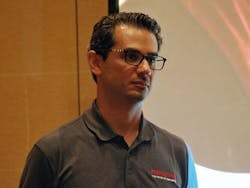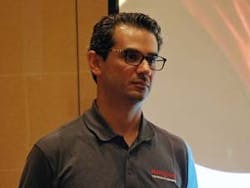“It’s not so much about what you need to know. It’s more about where that information is.” Honeywell’s Youssef Mestari explained where millennials’ expertise lies at this week’s Honeywell Users Group Americas 2018 in San Antonio.
How do you equip every field worker with the same resources and skills that your best one has? Because the next generation of workers, the millennials, prefers the ability to access information in a video format, the most efficient and productive strategy could be outfitting veteran operators and technicians with video-camera-equipped hardhats and asking them to record what they’re doing, said Youssef Mestari, global strategic marketing director, Honeywell Process Solutions. These videos can then be used to create a library of captured knowledge for younger workers to reference after experienced employees have retired and their working expertise is gone.Mestari and Honeywell Product Manager Annemarie Diepenbroek led a roundtable discussion on field-worker effectiveness at Honeywell Users Group Americas 2018 in San Antonio. “It’s not so much about what you need to know,” explained Mestari. “It’s more about where that information is. We need to enable knowledge that can be accessed from anywhere at any time. Millennials are the smartest, most dedicated generation we’ve seen. We have to put the right tools in their hands. What they want are the tools to capture and store knowledge and the ability to give that back to them how they want it. Some people like to watch information in videos. That’s the holy grail.”
Newer technicians and operators learn differently from the people who have been there a number of years, commented one of the roundtable participants. “How do we make them better trained employees?” he asked. “Cell phones and mobile devices are the norm for the new generation.”
The younger the worker, the more they have a base of knowledge but without experience, said another participant. “They don’t need to have the information. They just need to know how to find it. That is how they work,” he explained. “We began our careers memorizing set points and parameters, but that’s not how it’s done any more. They just need to know how the system works and where to find the set point.”
Mobile devices the norm
The ability to access information, whether it’s in written-word form or in a visual format, in the field requires a mobile device with the ability to deliver that content. Many of the participants had already equipped workers with tablets and shared their anecdotal results.
“All of our operators and technicians do their rounds with tablets,” said one individual. “They like it. It works well. They like to be able to take pictures. But we had to ensure all of the GPS was turned off because they didn’t like being tracked. If an operator is hot, for example, and goes into a building to cool down, that is being recorded.”
All mobile devices are not equal, however. Another participant reported that his facility had recently loaded one particular type of industrial tablet for its field techs. “It wasn’t real user-friendly, so now we’re using iPads and iPad minis,” he reported. “They got way better reception than I thought they would. Every operator has a device and is responsible for it. We discourage them from taking them home, however, because then they might not remember to bring them back.”
Another participant’s plant tried cell phones, but the small screen created a lot of problems with miskeyed information. And sometimes the devices overheat and shut down if they’re left in a truck on a hot day.
Bet your bottom dollar
“In terms of the technology, our younger folks adapt to it pretty quickly, but our older folks are fighting it tooth and nail,” admitted one participant.
“For those workers with standard operating procedures, how do you know they are complying?” asked Mestari, following up. “How do you know someone has done an assigned round? How do you monitor execution and capture it?”
Years ago, one participant commented, his company got rid of its hard copies and went to an online database—but the older workers can still print them out and check boxes. “Like safety, that procedure is instilled in them: When the paperwork is turned in, the initials and checkboxes are turned in, too.”
Another participant admitted a couple of his organization’s sites also initial and check off hard-copy documents, but the reality is that those documents are often filed away or put on a shelf, never to be used again.
Mestari questioned the bottom-line benefits of some existing practices, as well as newly implemented ones. Measurement is the only way to be sure, he said.
Digitizaling rounds
“We’re committed to digitalizing 25 new procedures a month,” contributed another roundtable participant. “Finding the subject-matter experts (SMEs) to work on these is challenging. It takes 12 hours per procedure. And there’s a lot of repetitive information in there.”
Turning analog documents into usable digital forms is a one-time investment, but it’s still a cost that can be measured. “As soon as you digitize, you have the timestamp, which enables analytics. You can see how long things take,” explained Diepenbroek.
But whose responsibility is that initial cost of conversion? “Is it something we should do or something the equipment manufacturer should provide to us?” pondered one participant. “You look at the cost and the perceived benefit and how much work it’s going to take to implement it. Is it something we want to pursue? It’s a huge task, but it’s great once something is set up.”
However, the clock is ticking. There’s always a risk of retirement with SMEs. Until then, how are they deployed? Do you need an SME for each site? How do you share that expertise across sites?
One participant said his company has a knowledge center for each site. “We don’t standardize across sites,” he added.
Another participant’s company has operations experts who travel. “That really doesn’t work very well,” he explained. “We’re trying to do it within the plant so each person has some ownership. A lot of times they’re just disconnected. In mechanical rotating inspection, for example, it’s a struggle. Sites like their own people. There’s a trust issue.”
One company had three sites all overseen by the same manager. “We help each other out,” the participant explained. “We all have the same overall boss, so he makes sure we share equally.” The organization rewards the SMEs with bonuses for going to the other facilities when they have to be away from home for multiple weeks, but, while that knowledge is being shared, it isn’t being captured.
Message in a bottle
Recording the knowledge of seasoned workers and transferring that knowledge to new ones is the one-two punch of effective operations. But roundtable participants differed in their opinions on preferred approaches. “It needs to be a mentorship approach to capture that. There’s no point in writing procedures,” said one. “When you write procedures, the next person coming along doesn’t look at them and will write their own. You can’t read the book if you don’t even know where to find it.”
Another company starts early, training prospective employees when they’re interns. “We’re going to lose a lot to retirement,” he warned. “It takes five years to have a good technician trained out in the field and three to four years for an operator. We just hope that they stay. Some will, but others will chase salary around.”
About the Author
Mike Bacidore
Mike Bacidore

Leaders relevant to this article:


